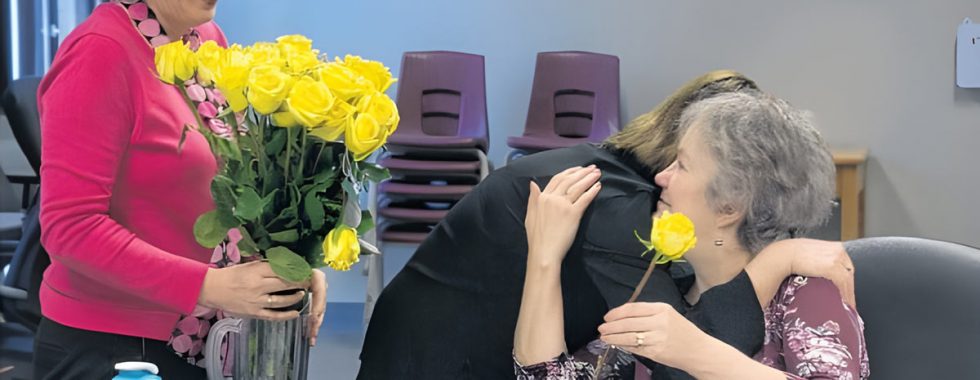When Lavinia Parrish Zwicker presented yellow flowers to board members at the final Annapolis Valley Regional School Board meeting on March 27, there was not a dry eye in the room.
She said how the flowers, which stand for happiness and friendship, signify the relationships and intense respect that the board members have developed over the course of their years of cooperation.
As each board member received their rose and hugged Zwicker, the board chair, there was laughter, hugging, and tears.
Take a deep breath, everyone; we can do this, she urged.
Vote to Dissolve Passes
No new business was announced after the final reports were provided since each member had their final meeting minutes approved by the board as a whole.
“It’s sad and bittersweet, but we understand that we still have work to do. We have to do that task tonight,” stated Zwicker.
Each individual congratulated their coworkers and the administrative team, recalled old inside jokes and heated discussions, and expressed their delight in giving back to their communities and working for the students.
“We genuinely care about this job. We’re committed to serving students, and doing so occasionally requires us to make difficult choices, she added.
The board, which was established in 1996, also decided to legally dissolve itself, after which there was a long hush.
Since our representatives were chosen by the people, not appointed by anyone, “our diverse perspectives we brought to the table generated a full and interesting dialogue.”
Zwicker expressed her expectations that the government will implement all of the Glaze report’s recommendations, including making sure that agencies work together and implement new financing formulas and that their emphasis will be on kids going ahead.
“We know our youngsters will be protected every day in the classroom, no matter what is happening with the adults in our world,” she said.
Ongoing Representation for Minorities: Concerning
The Race Relations, Cross Cultural Understanding and Human Rights, or RCH, the committee submitted a letter to education minister Zach Churchill in its final act, according to Tassa Kennedy, the board’s Mi’kmaq representative, requesting that the government ensure a greater balance of voices to represent A NS and Mi’kmaq students and families on the transition team and the provincial advisory council.
She is concerned about the removal of regional representatives for the African Nova Scotian and Mi’kmaq groups, as is board member Peter Cromwell who represents African Nova Scotians.
In addition, a group of Bridgetown kids named their new school street after Cromwell’s mother, Edith Hope Cromwell, demonstrating that the work done by RCH councils has benefited all children, not only minority ones, according to Cromwell.
We had no chance in hell, he added, “that a street would ever be named for a black woman.”
Students need to be able to picture the new Canada in which everyone lives, and they are achieving that. However, we could now lose that. How would this new representative handle every issue, given that he is not Superman? That’s not conceivable, Cromwell responded.
Loss of Local Voice as a Potential Problem
In the future, Cromwell and Kennedy concur that rural minority students — rather than those who live close to Halifax, where the new provincial advisory council will have its headquarters — are their primary concern.
Cromwell is concerned that people of disengaged and disenfranchised groups would once again suffer since they won’t be able to access the proper channels for advocating for their children.
He declared, “This is a serious issue that affects more than simply African Nova Scotian students.
Kennedy concurred, stating that “a lot of voices would be lost” as a result of the decrease in representatives.
We wanted more voices and seats, so that’s why we wrote the letter, she explained.
“We’re hoping that the transition team can figure this out. The Annapolis Valley still needs to hear from us.
Zwicker hopes that the new provincial advisory committee will keep its primary emphasis on the kids by learning what parameters they will have to function under.
“We must acknowledge that the public is aware that they have a board member that speaks for them. Since the sessions were conducted close to them, they could physically attend, she said.
It will be interesting to see if that local voice is still present.

